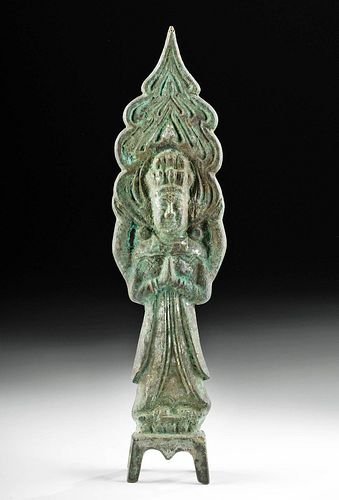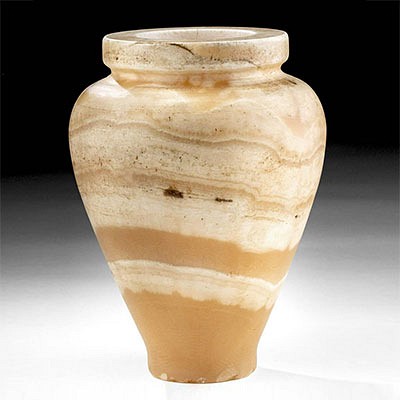Chinese Tang Dynasty Brass Bodhisattva Figure
Lot 84
About Seller
Artemis Fine Arts
686 S Taylor Ave, Ste 106
Louisville, CO 80027
United States
Selling antiquities, ancient and ethnographic art online since 1993, Artemis Gallery specializes in Classical Antiquities (Egyptian, Greek, Roman, Near Eastern), Asian, Pre-Columbian, African / Tribal / Oceanographic art. Our extensive inventory includes pottery, stone, metal, wood, glass and textil...Read more
Categories
Estimate:
$600 - $900
Absentee vs Live bid
Two ways to bid:
- Leave a max absentee bid and the platform will bid on your behalf up to your maximum bid during the live auction.
- Bid live during the auction and your bids will be submitted real-time to the auctioneer.
Bid Increments
| Price | Bid Increment |
|---|---|
| $0 | $25 |
| $300 | $50 |
| $1,000 | $100 |
| $2,000 | $250 |
| $5,000 | $500 |
| $10,000 | $1,000 |
| $20,000 | $2,500 |
| $50,000 | $5,000 |
| $100,000 | $10,000 |
| $200,000 | $20,000 |
About Auction
By Artemis Fine Arts
Dec 17, 2020
Set Reminder
2020-12-17 10:00:00
2020-12-17 10:00:00
America/New_York
Bidsquare
Bidsquare : VARIETY SALE | Antiquities & Ethnographic Art
https://www.bidsquare.com/auctions/artemis-gallery/variety-sale-antiquities-ethnographic-art-6207
Featuring classical antiquities, ancient and ethnographic art from cultures encompassing the globe. Egyptian, Greek, Roman, Etruscan, Near Eastern, Asian, Pre-Columbian, Native American, African / Tribal, Oceanic, Spanish Colonial, Russian, Fossils, Fine Art, more! Artemis Fine Arts info@artemisgallery.com
Featuring classical antiquities, ancient and ethnographic art from cultures encompassing the globe. Egyptian, Greek, Roman, Etruscan, Near Eastern, Asian, Pre-Columbian, Native American, African / Tribal, Oceanic, Spanish Colonial, Russian, Fossils, Fine Art, more! Artemis Fine Arts info@artemisgallery.com
- Lot Description
East Asia, China, Tang Dynasty, ca. 618 to 907 CE. A beautiful brass statuette of a bodhisattva, perhaps Avalokitesvara who embodies the compassion of all Buddhas, standing barefoot on a four-legged integral pedestal and dressed in a floor-length robe with a zigzag-collared overcoat. The tranquil figure holds both hands together and closes both eyes, as though in prayer or meditation. His serene visage features a flat nose and full-lipped mouth, curved in a gentle smile. An ovoid bhindi graces his head, just below his elaborate headdress formed from two tiers of upward pointing petaloid shapes. As traditional in representations of bodhisattvas, he is lavishly decorated with sizable circular earrings falling to his shoulders and many bangles hanging from his wrists. Two additional arms reach upward from his sides to hold up a large flame-like ornament that rises behind his head, ending in a point. Liberal remains of a lustrous paint, or possibly silver, accent the surface of this remarkable example from Chinese Buddhist culture! Size: 2.45" W x 9.5" H (6.2 cm x 24.1 cm)
The term Bodhisattva is derived from the word bodhi which means enlightenment. A Bodhisattva is an enlightened being who foregoes entering paradise in order to assist others to achieve enlightenment or Buddhahood. Bodhisattvas are among the most compassionate beings in the universe, devoting themselves to saving the suffering. Traditionally depicted as less austere than Buddhas with graceful postures and elegant garments, this piece is no exception.
Provenance: private collection of the late Karming Wong, acquired late 1970 to early 1980
All items legal to buy/sell under U.S. Statute covering cultural patrimony Code 2600, CHAPTER 14, and are guaranteed to be as described or your money back.
A Certificate of Authenticity will accompany all winning bids.
We ship worldwide and handle all shipping in-house for your convenience.
#156510Liberal remains of silvered or painted covering, as shown. Nice preservation of form and rich patina.Condition
- Shipping Info
-
All shipping is handled in-house for your convenience. Your invoice from Artemis Gallery will include shipping calculation instructions. If in doubt, please inquire BEFORE bidding for estimated shipping costs for individual items.
-
- Buyer's Premium



 EUR
EUR CAD
CAD AUD
AUD GBP
GBP MXN
MXN HKD
HKD CNY
CNY MYR
MYR SEK
SEK SGD
SGD CHF
CHF THB
THB














